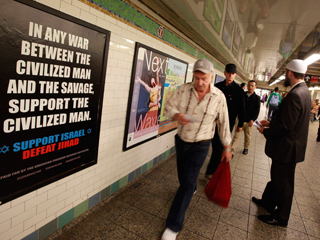I’d like to say it’s been a quiet week in my hometown, as Garrison Keillor recites at the beginning of his monologues on public radio’s A Prairie Home Companion. But I’m never able to say that, because I’m not from Lake Wobegon. I’m a New Yorker by birth and by attitude, though not by residence over the past nearly three decades.
The commotion in recent days has been over an ad posted in subway stations that equates the Islamic principle of jihad with savagery. “In any war between the civilized man and the savage, support the civilized man,” says the ad, sponsored by a pro-Israel citizens group. “Support Israel. Defeat Jihad.”
Let’s skip over the part where I acknowledge that people have a right to express their opinions. And let’s skate over the place where I hold that civilized people try to build bridges of understanding between religious traditions. They don’t dynamite them.
What should be noted is that the ad is also theologically untrue. Maybe that’s beside the point, but it communicates that jihad is essentially a principle of bloodletting. That’s like saying the Trinity or the Chosen People are vile notions, because some fundamentalist Christians and right-wing Israeli settlers, respectively, are doing odious things in the name of those beliefs. I wouldn’t expect to look up and see that message on a cardboard poster while riding the D train into Brooklyn.
Jihad is usually taken to mean “holy war” in the West and, fair to say, in the violent precincts of Muslim extremism. But in the vast reaches of Islam, it refers primarily to a different kind of struggle—to improve our world and, first of all, ourselves.
Nearly a year after the atrocities of September 11, 2001, I had a conversation about this with University of Virginia religion scholar Abdulaziz Sachedina, who had just written a book titled The Islamic Roots of Democratic Pluralism. He pointed out that Mohammed spoke of an “inner jihad,” a struggle against one’s baser instincts. In fact, Mohammed called this the “greater jihad,” as distinct from the “lesser jihad” of struggle against external enemies.
Turns out that for those Muslims who don’t point their guns randomly at infidels (in other words, nearly all of them), jihad may have less to do with war than with reconciliation. “The ability to forgive requires a jihad against one’s anger and resentment in order to restore one’s spiritual station by participating in the divine attribute of forgiveness,” Sachedina wrote in his book.
To me it sounds a lot like the Augustinian notion of the inner self as a battleground, a clash of wills between our lower and higher selves.
Try fitting that message onto a subway poster. But I take some assurance in the live-and-let-live philosophy of New Yorkers, one of whom was quoted in a Reuters dispatch. “It’s not right, but it’s freedom of speech. To put it on a poster is just not right,” said a 29-year-old man as he strode through the Times Square station. “But it caught my attention and I support freedom of speech, so you got to live with it.”
Reuters said most subway riders passed by the ad in a tunnel there without even noticing it. That’s a bit assuring, too, though I also saw, in another item, a photo of a young woman in traditional Muslim headdress, staring at the ad. I can only imagine what she was feeling at that moment. …read more






